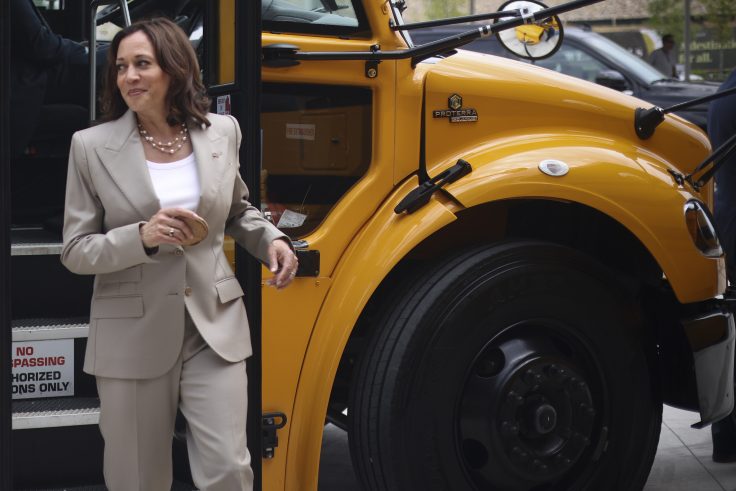Lion Electric, which received $159 million in federal funds to manufacture electric buses, has fallen into bankruptcy and failed to deliver $95 million worth of buses

The Biden administration awarded Canadian electric bus maker Lion Electric $159 million to manufacture 435 school buses between 2022 and 2024, making it the third-largest recipient of such funding. The company has since fallen into bankruptcy, failed to deliver hundreds of the buses it promised, and warned school districts that its dire financial straits prevent it from servicing those in circulation.
As a result, many of those districts are turning back to diesel.
The Washington Free Beacon reported earlier this year that Lion, then nearing bankruptcy, had yet to deliver $95 million worth of the electric buses it pledged to produce as part of the Biden administration’s $5 billion Clean School Bus program. Since then, Lion was sold for just $6 million during bankruptcy proceedings after being valued at $4.7 billion as recently as June 2021. The company also permanently shuttered multiple manufacturing plants, fired the majority of its employees, and told consumers that it could no longer honor warranties and purchase orders in the United States.
Lion’s dramatic fall from grace marks one of the most apparent failures stemming from Democrats’ green energy agenda, particularly as school districts turn back to the diesel-powered vehicles the Clean School Bus program was designed to phase out.
“All of our contacts from Lion that we worked so closely with to ensure the project’s success have been fired,” Mike Leskowich, superintendent of the Homer Community School District in southern Michigan, told the Free Beacon. “We are going to keep our electric fleet on the roads for as long as possible. Eventually, however, we will return to diesel, as the cost of the vehicle is far less than electric.”
Leskowich, whose district received $2.8 million in federal funding to procure seven Lion buses in 2022, added that Homer schools have started sourcing their own parts to repair their buses. He told the Free Beacon that it “does hurt” that the buses’ warranties are no longer valid.
Charlie Butler, superintendent of the Madison Parish School District in northern Louisiana, said the 14 Lion buses his district received are still new, but that he is struggling to find companies that can repair them.
“Some of the issues do require funding, which we are managing at this time,” Butler told the Free Beacon.
Established by Democrats’ 2021 infrastructure bill, the Clean School Bus Program emerged as one of the Biden administration’s signature climate initiatives.
“Who doesn’t love a yellow school bus, right?” then-vice president Kamala Harris asked when promoting the program in 2022. “It’s part of a nostalgia, a memory of the excitement and joy of going to school to be with your favorite teacher, to be with your best friends, and to learn. The school bus takes us there.”
Climate activists have advocated for school districts to transition from their diesel-powered bus fleets to electric ones to reduce greenhouse gas emissions. Electric buses, however, are prohibitively expensive for most school districts. They cost more than $350,000 on average, whereas new diesel-powered buses typically cost around $100,000, according to environmental think tank Resources for the Future. They also require districts to invest in high-powered charging infrastructure and new training for drivers.
Several school districts across the country have completely removed their Lion buses from service over mechanical and safety concerns. A superintendent for a Midwest school district told industry publication Clean Trucking the district’s buses could not heat up in cold weather, lost steering and braking ability at times, had defective frames, and regularly displayed error messages that forced drivers to reset the vehicles.
“The buses do not run for more than a month before needing more repairs,” Coleen Souza, assistant to the superintendent of Winthrop Public Schools in Maine, told Clean Trucking.
School officials whose districts have not received the Lion buses the Biden administration had promised them are losing hope that their vehicles will ever arrive.
“We have not received any buses,” Dawn Wallace, superintendent of the Ohio Valley School District in Adams County, Ohio, told the Free Beacon. “At this point, we are not really hopeful that we will. We will maintain our diesel-powered fleet and, yes, continue to purchase those in the future.” Jason Stabler, superintendent of the Bureau Valley School District in Manlius, Ill., echoed Wallace’s concerns.
“The situation remains unresolved at this time, and we are currently waiting to see how it will be addressed and resolved by the court system,” Stabler said.
Environmental Protection Agency spokeswoman Brigit Hirsch told the Free Beacon in a statement that the agency is actively monitoring Lion’s bankruptcy proceedings and “evaluating all options.” She referred the Free Beacon to the Department of Justice for further questions.
Travis Fisher, director of energy and environmental policy studies at the Cato Institute, told the Free Beacon that the problems Lion’s situation present were a predictable consequence of the Biden administration’s policies.
“For anyone who thought the transition to EVs would be easy or even profitable, this is yet another example that perhaps there will be large bumps in the road,” Fisher said.
















